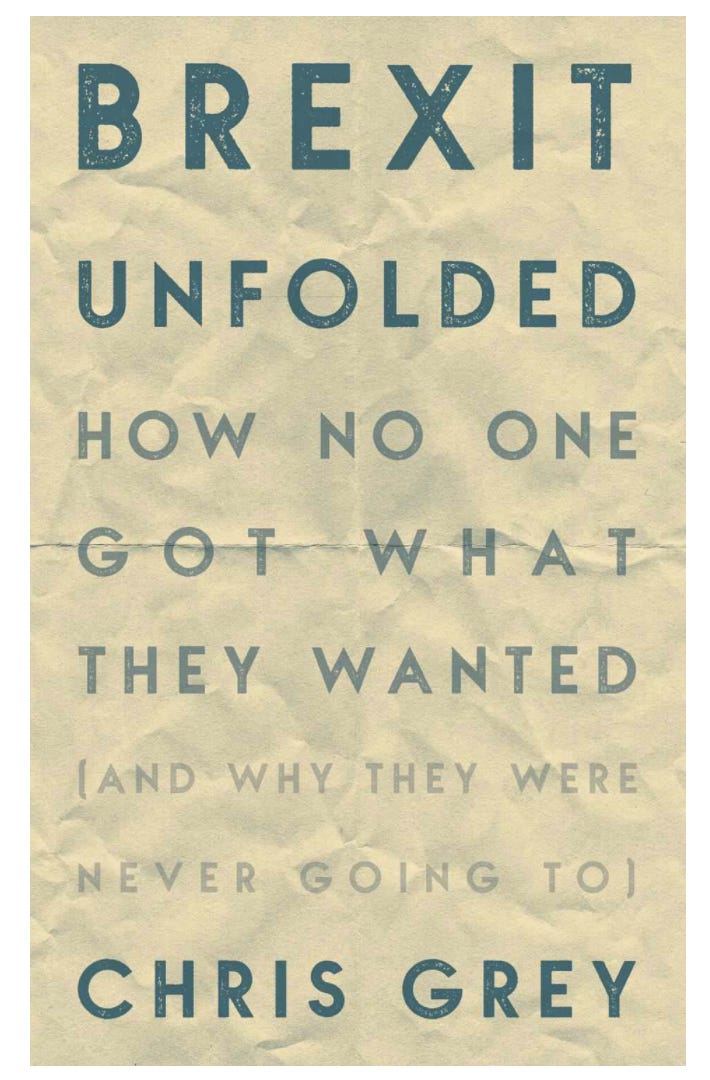Brexit Unfolded: A short review of Chris Grey's book, published on the 5th anniversary of the referendum
It's a must-read.
Chris Johns
Published on the 5th anniversary of the fateful Brexit referendum, Professor Grey’s new book guides us through the often tumultuous events of the last half decade. Grey is very focused: he takes the referendum result as given and examines what the victors did next. It’s not a pretty picture.
Grey forensically picks apart Theresa May’s infamous phrase, ‘Brexit means Brexit’. What that actually meant, of course, depended on who you asked. A bit like Heisenberg’s uncertainty principle: we might know what Brexit meant to one person but it always seemed to shift depending on who you asked. If Brexit could be pinned down at one point in time it was always impossible to know where it was going. It still is.
Although a self-described Remainer himself, Grey doesn’t spend much time examining the creed of his own tribe. Neither is he much interested in the the EU or the denizens of Brussels. Leave won the referendum and made lots of claims and promises - both before and after their victory. Each of those promises is carefully recorded and examined: most turn out to have been hot air. Far too many turned out to be lies. In our podcast together, Grey tells me that he thought about an alternative sub-title for the book:
‘you can’t turn lies into policy’.
This, for me, is the strength of this book. The patient examination of everything claimed by the Brexiters and the resulting paradoxes, contradictions and impossibility of turning those promises into actionable, executable, policy.
To his credit, Grey is more interested in what was said rather than who said it. There are no ad hominem attacks here. David Davies is revealed as a bit of a twit not because he is described in those terms but because of the long list of things that he said that are demonstrated to be false. Whether he is a mendacious twit is left to reader to decide.
The culture war that Brexit unleashed is part of this book, as it had to be. But it is not the main part. Grey notes its existence and the way in which the debate became tribal. Once that happened, it became inevitable that nobody was ever going to change their mind, notwithstanding any evidence or, indeed, personal experience, that suggested they should.
One of the mysteries of Brexit is how the ill-defined referendum question, answered in a way that suggested a very divided country, was then delivered, finally, as the hardest of all possible Brexits. Grey points the finger firmly at Theresa May and her key adviser who, we think, wrote the infamous Lancaster House speech. In that speech the Prime Minister set the UK on the path - if it wasn’t already there - towards the uncompromising Brexit that was ultimately delivered by Boris Johnson.
All of the opportunities to build a national consensus, or at least to try, were studiously avoided by May. No attempt to ask the question, ‘What kind of Brexit?’ was made by this most unintrospective of Prime Ministers. Her earlier experiences at the Home Office and her hostility towards immigration probably played a part here, informing the early decision to end free movement with all of the attendant implications for single market membership.
It didn’t help that so many Brexiters didn’t - and still don’t - understand the difference between the customs union and the single market. Whether this was laziness, intellectual inadequacy or mendacious lying is often left hanging.
All that stuff about Canada+, Norway, EFTA and other free trade agreements seemed to reveal was, at best, confusion. When the UK asked for Canada+++ (or Norway or anything else), the EU would tell the British they could have it and what that meant. The Brexiters would then complain about being ‘punished’. Rinse and repeat through years of negotiations. The fundamental contradiction was revealed each time Brexiters complained about not having single market access, notwithstanding the decision to leave that single market.
The book takes us through all of this in a way that is scrupulous and fair. Grey reminds me during our discussions that UKIP did, in fact, campaign on a platform of leaving the single market, despite my claim to the contrary. The book is about facts: where they collide with opinions and the unreliability of memory. It is much more than a comprehensive record of what happened but it is at least that. There is much in the book that I didn’t know, had forgotten or was mistaken about.
The book is a must-read. It is the definitive account of the last five years. But as Grey says, Brexit is far from over. There is the next five years and beyond. I suspect that Professor Grey has one or two more Brexit books to write.




